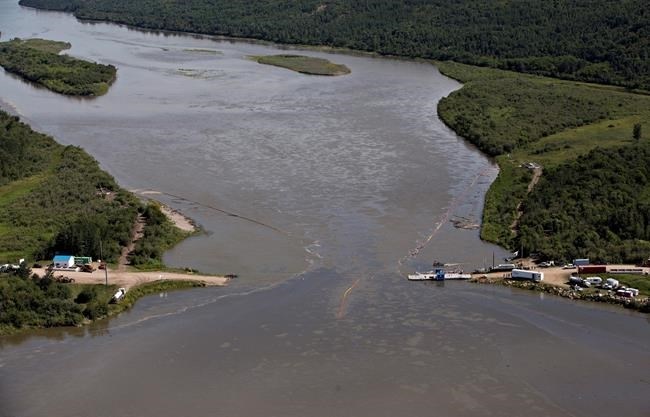
Crews work to clean up an oil spill on the North Saskatchewan river near Maidstone, Sask on Friday July 22, 2016. Husky Energy has said between 200,000 and 250,000 litres of crude oil and other material leaked into the river on Thursday from its pipeline.
Image Credit: THE CANADIAN PRESS/Jason Franson
July 28, 2016 - 7:00 AM
PRINCE ALBERT, Sask. - Saskatchewan Premier Brad Wall says his top concern right now is making sure communities affected by an oil spill have enough drinking water and the wider debate over pipelines can wait.
"We need to make sure that drinking water is available, that potable water is available to communities affected by this. That's the first challenge," he said Wednesday in Regina.
"We'll get into the debate on pipelines versus rail or how we move oil across this country at a later date, but for now I think we should just set it aside."
A Husky Energy (TSX:HSE) pipeline last week spilled between 200,000 and 250,000 litres of oil into the North Saskatchewan River.
The slick has already hit the cities of North Battleford, Prince Albert and Melfort, where water intakes have been shut down and measures to conserve drinking water have been put in place.
An incident report filed by Husky on Tuesday said a leak was discovered around 8 p.m. on July 20, a day earlier than initially believed. The company later clarified that it was alerted to "pressure anomalies" that evening, but it did not confirm there had been a leak until the next morning. It began shutting down the line around 6 a.m. last Thursday and informed the Saskatchewan government around 10:30 a.m.
Wall noted Husky has said it will review what happened and why there was a delay, but added the company's response to the spill itself appears to have followed protocol.
He also said he expects Husky to live up to its promise to cover the costs of cleanup — and more. Car washes and laundromats, for example, have had to shut down as communities conserve water.
"We think of the big costs and the responsibility for those are on the company," said Wall.
He was planning to visit the affected area on Thursday. But local officials, saying they wanted to focus on their response efforts, asked the premier to wait until later.
Shelley Gordon, owner of the 6th Avenue Car Wash in Prince Albert, has not been able to run her business since Monday.
"It's been very unfortunate. Employees are without wages. We're without revenue to get through this tough time," she said.
On a normal summer day, cars would be lined up, she said.
"This is when car washes make their money. It makes up for the days in January and December when we're really quiet. It's an unfortunate time of the year to have a disaster like this happen."
The cleanup effort has run into some challenges.
The oil sheen has been dispersing as it moves downstream, which makes it more difficult to skim it off the surface, said Wes Kotyk with Saskatchewan's Ministry of Environment.
Nine booms have been placed on the river where they're believed to be most helpful, but their performance is in question.
"They're likely not going to be very effective in accumulating or collecting any of the material once the sheen gets that thin."
Some of the oil has sunk, but it's not clear how much. There is no plan yet to clean up the below-surface oil because not enough is known about how the heavy conventional crude reacts in water.
Samples have been sent for analysis and Husky has been helpful in providing its own chemical tests, said Lo Cheng, with the federal Environment and Climate Change Department.
"Really what we need to understand is how does that product behave in this environment? What is its fate? Does it degrade? Does it break down? Does it interact with sediment?"
Sam Ferris of Saskatchewan's Water Security Agency said North Battleford should have enough water in its reservoirs if it continues its conservation efforts and there is no major event, such as a major fire, to deplete the supply.
One other option being considered is to pre-treat the oil-tainted river water before it enters the plant.
In Prince Albert, the city manager said a temporary pipeline that was to be completed on Wednesday to bolster the city's water supply wouldn't be done until Friday.
The line — essentially a giant hose — is to run about 30 kilometres to the South Saskatchewan River, but Jim Toye said pumps to move the water were not ready.
— By Lauren Krugel in Calgary
News from © The Canadian Press, 2016